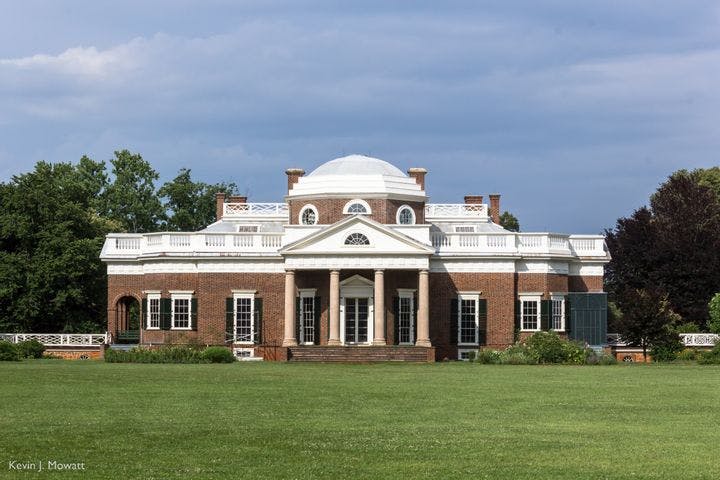Spring 2010
Man on the Run
– Max Byrd
To many of Jefferson's contemporaries, his greatest scandal had nothing to do with Sally Hemings.
For many of Thomas Jefferson’s contemporaries, the greatest scandal of his life had nothing to do with Sally Hemings. It was his sudden and hasty—his enemies said cowardly—flight on horseback from Monticello on the morning of June 4, 1781, just as a squadron of invading British cavalrymen began to gallop up the little mountain toward his house.
The invading soldiers were led by Colonel Banastre Tarleton, a ladies’ man with a notoriously brutal streak. He and his men belonged to a much larger British army, commanded by Lord Cornwallis, that had been burning and pillaging Virginia for nearly six months. The capital, Richmond, lay in ashes. The state militia, almost without weapons and ammunition, had melted away, and the Virginia Assembly had retreated to Charlottesville. Jefferson, 38 years old, had just ended his second and final one-year term as governor, but his replacement had not yet been elected. To capture the governor—not to mention the author of the Declaration of Independence—would have been an enormous coup for the British, and by all accounts Tarleton’s men arrived at Jefferson’s doorstep with a great clatter of horses and sabers.
Twenty-first-century historians may lift their eyes and see on the horizon the faint white sails of Comte de Rochambeau’s French fleet, making south toward Yorktown, and off to the west the long, dark line of George Washington’s Continental Army marching to meet them and trap Cornwallis. But in early June of 1781, none of this was visible. When the shaken assembly met in Staunton a week later, it seemed to many that an irresponsible Jefferson had abandoned his post at Monticello in a time of desperate need. An angry resolution was adopted that “an inquiry be made into the conduct of the Executive of this State for the last 12 months.” Privately, there was much muttering about impeachment or censure. It was, says Jefferson biographer Dumas Malone, “the nadir of the entire public career of Thomas Jefferson.”
The outlines of this episode have long been familiar to historians. Now, marshaling the primary sources, Michael Kranish, a reporter for The Boston Globe, has fashioned a brilliantly narrated account of the British invasion and Jefferson’s problematic response to it. If Kranish’s focus wobbles in the early chapters, where he devotes far too much time to a survey of pre-Revolutionary Virginia politics, he soon finds his center. From the moment the traitor Benedict Arnold swaggers onto the page, greedy, arrogant, helping to lead the British invasion, Kranish’s prose picks up speed and energy. It would be hard to improve on his novelistic images: When the whole assembly flees smoldering Richmond, Jefferson’s exhausted horse sinks under him on a country road, and the redheaded, bookish governor walks toward a nearby farm for help, “carrying his saddle and bridle on his shoulders.”
Here, as in the best novels, characters ultimately drive the plot. In the highly satisfying manner of early American history, the same dramatic and absorbing people converge on the same time and place. Confronting Arnold and Cornwallis, we have the humorless, ubiquitous Marquis de Lafayette and Baron von Steuben, the hero of Valley Forge (severely critical of Jefferson’s performance). On their heels come the great Washington, William Byrd III and his resourceful wife, Mary, the young James Madison, the still-younger James Monroe, even Daniel Boone, who makes a cameo appearance in the Charlottesville jail.
Yet on so crowded a stage, Jefferson still holds our eye. Stroke by stroke, a remarkable portrait emerges. There is the Jefferson quick to blame others when he fails to call up the militia in time. Jefferson the schemer, daringly plotting to kidnap Arnold out of the British camp. And Jefferson the hater, nursing a lifelong animosity toward Patrick Henry—the writer in him fascinated by Henry’s oratory, the politician envious and fearful. When he heard that Henry favored a tax in Virginia that would fund Christian denominations, Jefferson shockingly wrote to Madison, “What we have to do I think is devoutly pray for his death.”
A greater, nobler Jefferson also takes shape—a devoted husband and father, an executive capable of learning and changing, a firm and inspiring optimist. As for the Monticello raid, Kranish makes clear that Jefferson had no choice but to leave, and behaved reasonably, even bravely. Out of office, he reverted instinctively to the deepest part of his nature, scholar, not warrior, and consoled himself by beginning to write his one and only book, Notes on the State of Virginia. A year later, the Virginia Assembly found the charges against him baseless and offered the nearest thing to an apology. But the smear was impossible to erase. Twenty years later, in the presidential election of 1800, alongside charges of atheism and radicalism, Jefferson’s flight from Monticello would take its all-too-predictable place in the politics of mud and scandal.
* * *
Max Byrd, a contributing editor of The Wilson Quarterly, is president of the Squaw Valley Community of Writers and the author of Jefferson: A Novel (1993).
Reviewed: "Flight From Monticello: Thomas Jefferson at War" by Michael Kranish, Oxford University Press, 2010.
Photo courtesy of Flickr/KevArchive
